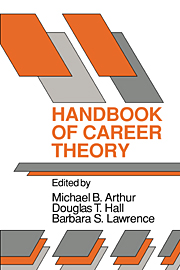Book contents
- Frontmatter
- Contents
- List of contributors
- Preface
- PART I CURRENT APPROACHES TO THE STUDY OF CAREERS
- PART II NEW IDEAS FOR THE STUDY OF CAREERS
- Introduction to Part II
- 11 People as sculptors versus sculpture: the roles of personality and personal control in organizations
- 12 Work, stress, and careers: a preventive approach to maintaining organizational health
- 13 Re-visioning career concepts: a feminist invitation
- 14 Reciprocity at work: the separate, yet inseparable possibilities for individual and organizational development
- 15 Career improvisation in self-designing organizations
- 16 Organization career systems and employee misperceptions
- 17 Blue-collar careers: meaning and choice in a world of constraints
- 18 A political perspective on careers: interests, networks, and environments
- 19 Rites of passage in work careers
- 20 Pin stripes, power ties, and personal relationships: the economics of career strategy
- 21 Rhetoric in bureaucratic careers: managing the meaning of management success
- 22 The internal and external career: a theoretical and cross-cultural perspective
- PART III FUTURE DIRECTIONS FOR THE DEVELOPMENT OF CAREER THEORY
- Name index
- Subject index
18 - A political perspective on careers: interests, networks, and environments
Published online by Cambridge University Press: 05 June 2012
- Frontmatter
- Contents
- List of contributors
- Preface
- PART I CURRENT APPROACHES TO THE STUDY OF CAREERS
- PART II NEW IDEAS FOR THE STUDY OF CAREERS
- Introduction to Part II
- 11 People as sculptors versus sculpture: the roles of personality and personal control in organizations
- 12 Work, stress, and careers: a preventive approach to maintaining organizational health
- 13 Re-visioning career concepts: a feminist invitation
- 14 Reciprocity at work: the separate, yet inseparable possibilities for individual and organizational development
- 15 Career improvisation in self-designing organizations
- 16 Organization career systems and employee misperceptions
- 17 Blue-collar careers: meaning and choice in a world of constraints
- 18 A political perspective on careers: interests, networks, and environments
- 19 Rites of passage in work careers
- 20 Pin stripes, power ties, and personal relationships: the economics of career strategy
- 21 Rhetoric in bureaucratic careers: managing the meaning of management success
- 22 The internal and external career: a theoretical and cross-cultural perspective
- PART III FUTURE DIRECTIONS FOR THE DEVELOPMENT OF CAREER THEORY
- Name index
- Subject index
Summary
The careers literature, like much of the literature in organizational behavior (Pfeffer, 1982), is dominated by a perspective that focuses on the individual or organization in isolation and argues either implicitly or explicitly from an efficiency-oriented or value or goal attainment perspective. Thus, individual career choices are presumed to reflect individual goals, needs, personality, or interests (Hall, 1976: Ch. 2), and the applications literature deriving from such a focus is oriented to self-assessment and self-discovery procedures to enhance individual career planning (Crites, 1973; Hall, 1976: Ch. 2; Strong, 1943). The organization's task is seen as one of defining the relevant abilities, which derive from the technical requirements of work, devising screening and selection systems to pick the most able applicants and then devising training programs, job rotation, and promotion ladders that motivate and retain as well as develop skills in the work force (Hall, 1976: Ch. 6; Schein, 1977; Schneider, 1976). The applicationsoriented literature developing from this perspective focuses both on the analysis of jobs in terms of skill requirements and task attributes (McCormick and Tiffin, 1974; Schneider, 1976: Ch. 2) and on screening procedures (e.g., Bray and Grant, 1966; Hall, 1976: Ch. 4), promotion and job rotation practices (Katz, 1982; Pelz and Andrews, 1966; Wellbank et al., 1978), and training and socialization efforts (e.g., Bass and Vaughan, 1966; Berlew and Hall, 1966; Morgan, Hall, and Martier, 1979; Van Maanen, 1982) to produce a motivated and skilled work force.
The purpose of this chapter is to propose an alternative perspective on understanding careers and career processes.
- Type
- Chapter
- Information
- Handbook of Career Theory , pp. 380 - 396Publisher: Cambridge University PressPrint publication year: 1989
- 44
- Cited by



